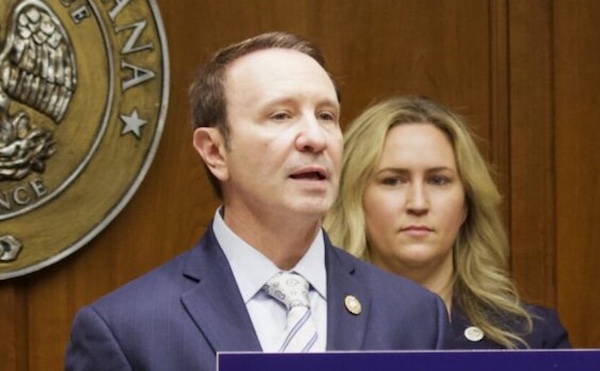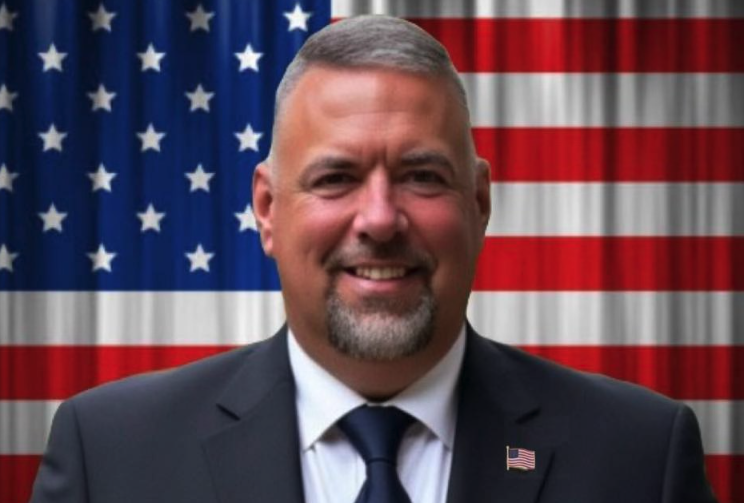Jim Beam column:State closing primaries again
Published 6:35 am Wednesday, June 25, 2025

- Louisiana Gov. Jeff Landry and state Rep. Julie Emerson, R-Carencro, sponsored the effort to return four state elections to closed Republican and Democratic party primaaries.(Photo courtesy of Remi Tallo at the Louisiana Illuminator).
Louisiana’s elections will be a little different in 2026. The state is going back to closed political party primaries for three public bodies on April 18, 2026, and a second or runoff primary on May 30, 2026.
The state will have closed Republican and Democratic party primary races on those dates for a U.S. Senate seat and six U.S. House districts, a state Supreme Court race and contests for two seats on the Louisiana Public Service Commission. The general election will be on Nov. 3.
The state Board of Elementary and Secondary Education will also have a closed primary for its next election on April 17, 2027, and its second or runoff primary on May 29, 2027.
Trending
Registered Republicans and Democrats will ballot in their party primaries but members of other parties can’t. However, in Louisiana’s closed party primaries, unaffiliated voters who are registered as “no party” can choose to vote in either the Democratic or Republican closed primary, but not both.
Members of the Green and Libertarian parties cannot vote in the primaries but they can vote in the general election. The state has an Independent Party but it is being dissolved by Act 84 of 2025 effective Aug. 1.
The act says, “A person who applies for registration on or after August 1, 2025, shall not be designated as ‘Independent’ or designated as being affiliated with the ‘Independent Party.’ An applicant who declares party affiliation as ‘Independent’ or with the ‘Independent Party’ shall have the party affiliation entered as ‘No Party’.”
Rick Gallot, the current president of the University of Louisiana System of higher education of which McNeese State University is a member, was a state representative for three terms and a state senator for one term.
When he was in the House, Gallot tried twice to make it possible for Louisiana voters to be called independents rather than no party. On his second attempt, he said his House colleagues would only vote to create an Independent Party, which is what happened. That is the party being dissolved by Act 84.
The secretary of state’s office as of 1:59 p.m., June 23, 2025, said the state had 150,411 members of the Independent Party. Party leaders agreed to dissolution of the party in order to give those voters an opportunity to vote in one of the closed primaries.
Trending
Louisiana has 2,979,443 voters, the office reported. There are 1,095,434 Democrats, 1,049,532 Republicans, 658,477 registered as No Party, 15,030 Libertarian Party members, 2,781 Green Party members, and all others, 7,778 members.
The next governor’s race will be an open primary contest on Oct. 9, 2027, which will also be the date for BESE’s general election. The gubernatorial general election will be on Nov. 20, 2027. Statewide elected officials, state legislators and local elections will be open primaries on Oct. 9, 2027, and the general election will be on Nov. 20, 2027.
Republican Gov. Jeff Landry at the first special session he called for Jan. 15, 2024, shortly after his 2023 election, wanted to hold closed primaries for all elections. However, legislators who had been elected at open primaries since 1975 wanted them to continue.
Legislators held closed primary congressional elections in 2008 and 2010, but Ballotpedia said widespread confusion during those two elections caused lawmakers to return to open primaries in 2012.
The same thing could happen again, but Landry isn’t one to give up his original goal of having closed primaries for all elections.
Robert Hogan, a political science professor at LSU, last July in an NPR report said Louisiana’s open primary has been very popular with voters and has been lauded by election reformers nationwide.
Landry was quoted in that same report when he said earlier last year a closed primary would result “in a stronger, more unified reach of elected leaders” in the state.
“Every voting-aged citizen in Louisiana may or may not join the political party of his or her choosing,” Landry said. “If you do choose to join a political party, it is only fair and right that you have the ability to select your party’s candidates for office, without the interference of another party.”
Landry may not be happy that 658,477 No Party voters can ballot in either the state’s Republican or Democratic party primaries, but he won’t have to worry about Democrats running with Republicans like they have been doing since 1975.
Jim Beam, the retired editor of the American Press, has covered people and politics for more than six decades. Contact him at 337-515-8871 or jim.beam.press@gmail.com.
| ReplyForward
Add reaction |




